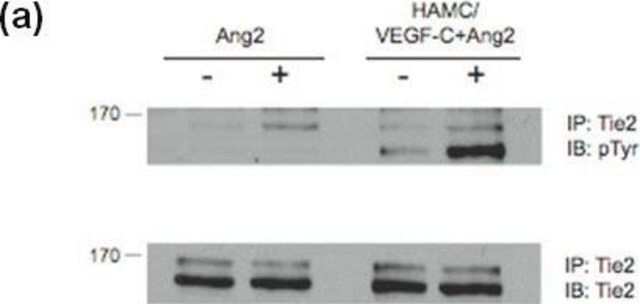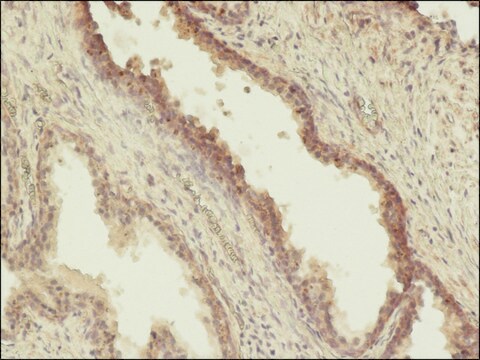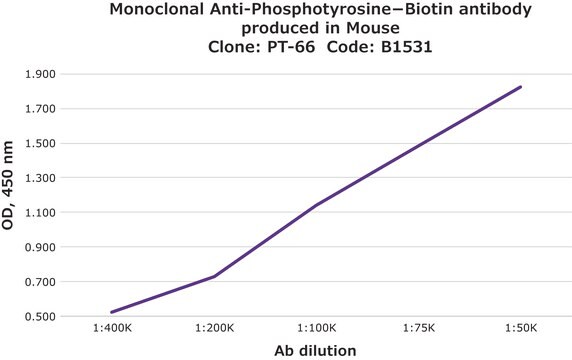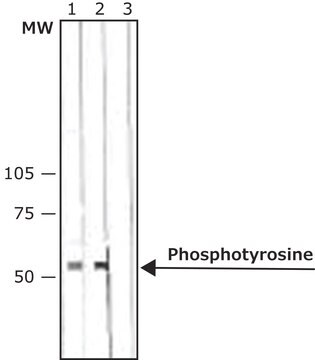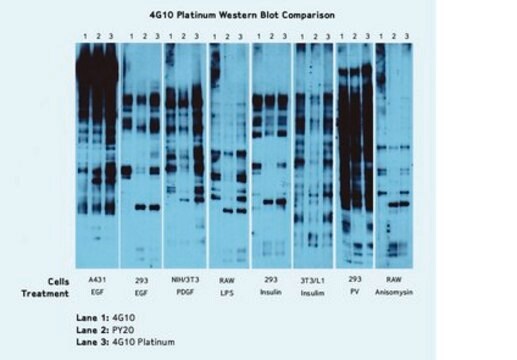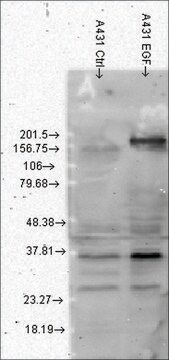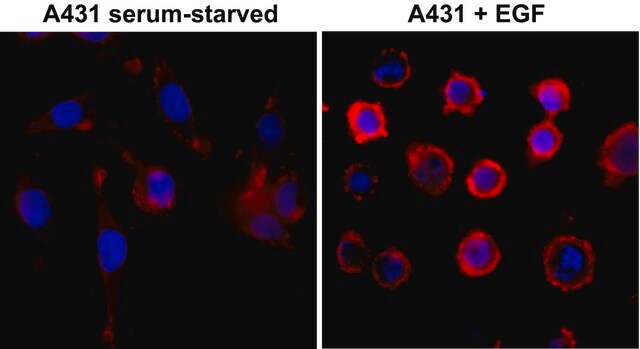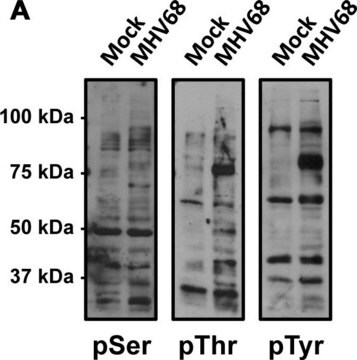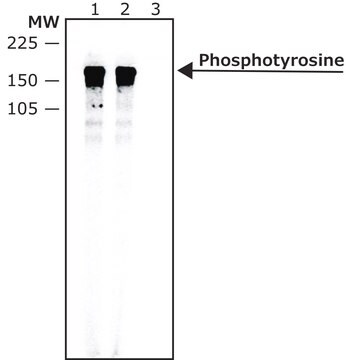おすすめの製品
詳細
ELISA, 競合ELISAにおいて、本抗体は、ホスホチロシンの遊離アミノ酸型および、BSA・KLH等のキャリア結合型の両方と特異的に反応します。非リン酸化チロシン、ホスホスレオニン、ホスホセリン、AMP、ATPとの交差反応はみられません。
Monoclonal Anti-Phosphotyrosine (mouse IgG1 isotype) is derived from the hybridoma produced by the fusion of mouse myeloma cells and splenocytes from an immunized mouse.
Phosphorylation, attachment of a phosphate group to protein, alters protein functionality by activation or deactivation of the protein, in which protein kinase plays a crucial role. Tyrosine residue phosphorylation plays a key role in cell growth and differentiation. The monoclonal anti-phosphotyrosine antibody is useful in immunoblotting for identification of phosphotyrosine containing protein from cultured human epidermoid carcinoma cell line A-431 and human platelets preparation. This product can be used in immunofluorescent labeling of tyrosine residue at focal adhesion and cellular junctions of cultured MDCK cells. This product is also useful in studies of signal transduction and growth factor receptors. This antibody has shown specificity for binding to proteins that contain phosphorylated tyrosine residue either in free amino acid form or in conjugation with KLH or BSA but will not react with non-phosphorylated tyrosine or other phosphorylated proteins and amino acids. It will also not react with phosphorylated molecules like ATP or AMP. Monoclonal anti-phosphotyrosine reacts specifically with mouse and human.
特異性
This antibody is specific for phosphorylated tyrosine both as the free amino acid or when conjugated to carriers such as BSA or KLH
免疫原
BSA結合ホスホチロシン
アプリケーション
Monoclonal Anti-Phosphotyrosine antibody produced in mouse has been used in
- immunocytochemistry
- immunoprecipitation
- western blotting
- peptide binding studies flow cytometry
- enzyme linked immunosorbent assay (ELISA)
- radioimmunoassay (RIA)
- immunoaffinity isolation
Monoclonal anti-phosphotyrosine antibody produced in mouse is used in immunohistochemisty, flow cytometry, immunoprecipitation, immunoblotting, ELISA and RIA for localization of phosphorylated tyrosine containing proteins. It can also be used for immunoaffinity isolation.
生物化学的/生理学的作用
Phosphotyrosine levels enhanced in cellular proteins leads to activation of several cellular processes mediated by phosphotyrosine kinases. Phosphotyrosine residues that are autophosphorylated by the binding of ligands associated with receptors like epidermal growth factor (EGF), platelet-derived growth factor (PDGF) and insulin receptors, functions as the primary integral component of mitogenic signaling cascade. Phosphotyrosine mediates the activation of T-cell as a result of phosphorylation of tyrosine residues by tyrosine kinases in cytoplasmic domains of CD4 an CD8 which in turn phosphorylates TCR-CD3 complex. Phosphotyrosine activity has also been found in many retroviruses whose oncogenes encodes tyrosine-specific protein kinase.
Tyrosine residue phosphorylation plays a key role in cell growth and differentiation.
物理的形状
This product is supplied as ascites fluid containing 15 mM sodium azide
保管および安定性
For continuous use, store at 2-8 °C for up to one month. For extended storage, the solution may be frozen in working aliquots. Repeated freezing and thawing is not recommended. Storage in "frost-free" freezers is not recommended. If slight turbidity occurs upon prolonged storage, clarify the solution by centrifugation before use.
免責事項
Unless otherwise stated in our catalog or other company documentation accompanying the product(s), our products are intended for research use only and are not to be used for any other purpose, which includes but is not limited to, unauthorized commercial uses, in vitro diagnostic uses, ex vivo or in vivo therapeutic uses or any type of consumption or application to humans or animals.
適切な製品が見つかりませんか。
製品選択ツール.をお試しください
保管分類コード
13 - Non Combustible Solids
WGK
WGK 1
引火点(°F)
Not applicable
引火点(℃)
Not applicable
適用法令
試験研究用途を考慮した関連法令を主に挙げております。化学物質以外については、一部の情報のみ提供しています。 製品を安全かつ合法的に使用することは、使用者の義務です。最新情報により修正される場合があります。WEBの反映には時間を要することがあるため、適宜SDSをご参照ください。
Jan Code
P3300-BULK:
P3300-.2ML:
P3300-VAR:
P3300-.5ML:
試験成績書(COA)
製品のロット番号・バッチ番号を入力して、試験成績書(COA) を検索できます。ロット番号・バッチ番号は、製品ラベルに「Lot」または「Batch」に続いて記載されています。
Nicholas G Clarkson et al.
The Journal of biological chemistry, 284(37), 24725-24734 (2009-07-10)
Regulation by the NK and T cell surface receptor CD244 in mice and humans depends both on engagement at the cell surface by CD48 and intracellular interactions with SAP and EAT-2. Relevance to human disease by manipulating CD244 in mouse
Cell signaling by receptor tyrosine kinases
Lemmon MA and Schlessinger J
Cell, 141(7), 1117-1134 (2010)
Activation of GABA receptors attenuates neuronal apoptosis through inhibiting the tyrosine phosphorylation of NR2A by Src after cerebral ischemia and reperfusion
Zhang F, et al.
Neuroscience, 150(4), 938-949 (2007)
Neuropathology in mice expressing human alpha-synuclein
van der Putten H, et al.
The Journal of Neuroscience, 20(16), 6021-6029 (2000)
Epidermal Growth Factor Receptor Down-Regulation Triggers Human Myoblast Differentiation
Boisguerin P, et al.
Chembiochem, 8(18), 2302-2307 (2007)
ライフサイエンス、有機合成、材料科学、クロマトグラフィー、分析など、あらゆる分野の研究に経験のあるメンバーがおります。.
製品に関するお問い合わせはこちら(テクニカルサービス)